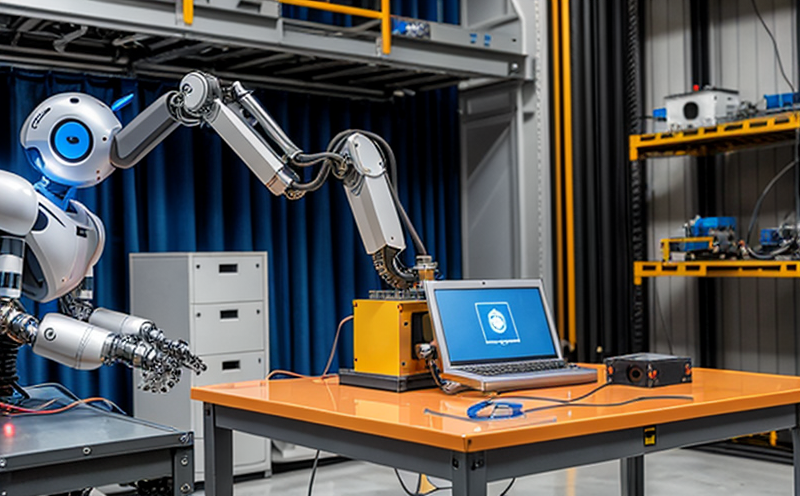UL 62133 Rechargeable Battery Safety in Robotic Hardware
The UL 62133 standard is a critical benchmark that ensures the safety and reliability of rechargeable batteries used in robotic hardware. This standard addresses potential hazards associated with battery chemistry, mechanical integrity, thermal management, and electrical connections. Compliance with UL 62133 is essential for manufacturers aiming to produce safe, reliable, and high-performance robotic systems.
UL 62133 covers a wide range of tests that evaluate various aspects of rechargeable batteries used in robotics. These include:
- Battery pack design
- Electrical safety testing
- Mechanical integrity assessment
- Thermal management analysis
- Labeling and marking requirements
In the context of robotic hardware, these tests are crucial for ensuring that battery packs can withstand the unique demands placed on them by robotics. Robots often operate in dynamic environments where they may be exposed to various stresses, such as vibration, mechanical shock, and temperature fluctuations. Proper testing ensures that batteries remain safe under all conditions.
The standard also addresses specific issues related to the use of lithium-ion batteries, which are commonly found in robotic hardware due to their high energy density and low self-discharge rate. However, these batteries can pose significant safety risks if not properly designed and tested. UL 62133 provides stringent guidelines for preventing potential hazards like overheating, short circuits, and physical damage.
Testing under this standard involves a series of rigorous procedures to simulate real-world conditions that robotic hardware might encounter. This includes:
- Thermal abuse testing
- Over-discharge and over-charge testing
- Vibration testing
- Crash testing
- Water resistance testing
The UL 62133 standard also emphasizes the importance of proper labeling and documentation. This ensures that users are aware of the risks associated with the batteries and how to handle them safely. Robotic hardware manufacturers must provide clear instructions on battery maintenance, replacement, and disposal.
In addition to compliance testing, our laboratory can offer a range of services to assist manufacturers in meeting the requirements of UL 62133. These include:
- Design reviews
- Prototype evaluation
- Certification support
- Training and consultation
We understand that achieving compliance can be challenging, but our team is dedicated to helping you navigate the process smoothly. Our laboratory is equipped with state-of-the-art facilities and experienced professionals who can provide guidance every step of the way.
By ensuring that your robotic hardware meets UL 62133 standards, you not only protect your users but also enhance the reputation of your brand in the market. This standard is recognized globally, and compliance will open up new opportunities for international sales and collaborations.
Applied Standards
The UL 62133 standard is based on internationally recognized guidelines that are continuously updated to reflect the latest advancements in battery technology and safety practices. Some of the key standards that inform UL 62133 include:
- IEC 60348
- EN 62196-1
- ASTM F2766
- ISO/IEC 17025
These standards provide a comprehensive framework for assessing the safety and performance of rechargeable batteries. By adhering to these guidelines, manufacturers can ensure that their products meet the highest quality and safety standards.
The UL 62133 standard specifically targets battery packs used in mobile devices and electric vehicles. However, its principles can be applied to a wide range of applications, including robotics. The standard emphasizes the importance of electrical safety, mechanical integrity, thermal management, and labeling requirements. These elements are crucial for ensuring that batteries remain safe under all conditions.
In addition to the technical aspects covered by UL 62133, compliance also requires adherence to international regulations such as:
- RoHS
- CAD
- CE marking
- Safety and environmental regulations in various countries
By ensuring that your robotic hardware meets these requirements, you can gain access to global markets and enhance the overall safety of your products.
Benefits
Compliance with UL 62133 offers numerous benefits for manufacturers of robotic hardware. These include:
- Enhanced Safety: Ensuring that batteries are safe from potential hazards, protecting users and preventing accidents.
- Increased Reliability: Robust testing helps identify and address issues early in the development process, leading to more reliable products.
- Global Market Access: Compliance with international standards opens up opportunities for exporting your robotic hardware to countries that require these certifications.
- Better Brand Reputation: Demonstrating a commitment to safety and quality can enhance your brand’s reputation and attract more customers.
- Cost Savings in the Long Term: Early identification of issues through testing can prevent costly recalls and repairs later on.
- Improved Customer Confidence: By meeting these standards, you reassure buyers that your products are safe and reliable.
- Support for Future Innovations: Adherence to current and future standards ensures that your products remain competitive in the ever-evolving robotics industry.
In summary, compliance with UL 62133 is not just a requirement but also an opportunity. It helps you build trust, improve product quality, and gain a competitive edge in the market.
International Acceptance and Recognition
The UL 62133 standard is widely recognized and accepted globally. It is used to ensure the safety of rechargeable batteries in robotic hardware, as well as other mobile devices and electric vehicles. Countries that have adopted this standard include:
- Australia
- Canada
- Europe (through EN 62196-1)
- The United States
- Japan
- Korea
By adhering to this standard, manufacturers can ensure that their products meet the requirements of these countries and gain access to international markets. The standard is also recognized by major certification bodies such as TÜV, UL, and Underwriters Laboratories.
The widespread acceptance of UL 62133 reflects its importance in ensuring the safety of rechargeable batteries used in robotic hardware. By meeting this standard, manufacturers can demonstrate their commitment to quality and safety, thereby enhancing their brand’s reputation and trustworthiness.





